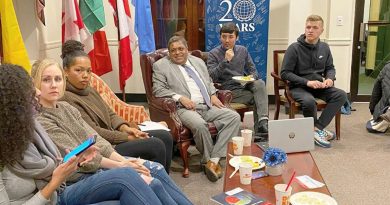Seton Hall Professor Brings Ancient Qur’an into the Modern Age
Mariah McCloskey
Managing Editor
Every student in the School of Diplomacy and International Relations has spent time in a foreign language classroom. Nonetheless, Diplomacy students may never know about the activities of the language department’s faculty outside of class. Recently, Professor Youssef Yacoubi, Director of Seton Hall’s Arabic Studies Program, had the opportunity to inspect and digitize a 17th century Qur’an.
In 2018, Dr. Yacoubi received the Seed Grant with the purpose of bringing to light some of the textual and calligraphic aspects of the 1698 manuscript of the Qur’an. Dr. Yacoubi stated that the main objective of the project was to “decipher the Arabic marginalia through a number of Google tools and applications.” In addition to uncovering the journey of the ancient book, his goal is that the Qur’an will be used as a digital tool for scholarship and teaching of language and culture.
Dr. Yacoubi maintained that these texts “solidify our understanding of material and religious cultures.” Because the Qur’an is sacred to Muslims and occupies a central position in many aspects of Islamic culture, universities have always paid particular attention to manuscripts of this type. Princeton University, where Yacoubi was a Doctoral fellow, holds nearly 10,000 Islamic manuscripts, including a substantial number of Qur’ans.
The new Seton Hall Qur’an exhibits “significant features of book illumination typical of medieval and classical literature of the Islamic world.” This project involves a number of specialists and experts worldwide who look at different aspects and measures already established within the different manuscripts.
Specifically, Dr. Yacoubi pointed out that at the top left side of the folio are the chapter title and verse numbers in bold golden letters. The title is in a gold-painted rectangular band ornamented with a golden medallion outlined in blue projecting into the left margin. These stylistic choices help distinguish certain phrases, inform the recitation, and increase the ability for movement from reading one chapter into the other. Dr. Yacoubi stated, “The aesthetic value of this Qur’an lies in the supplementary stylistic choices used.”
In addition to the digitization of this Qur’an, Dr. Yacoubi hopes to use the manuscript as a resource for his own courses in the future. After receiving the Seed Grant, he was given the Digital Humanities Fellowship in order to develop a course that introduces students to the new Qur’an and a plethora of other digital works, named Digitized Literatures and Cultures of the Islamic World. Dr. Yacoubi believes that students can “explore centuries of intellectual, cultural, scientific, and religious aspects of the Middle East through digitized manuscripts.” He hopes that through this, students can gain a deeper understanding of the Islamic world by means they can access anywhere.


